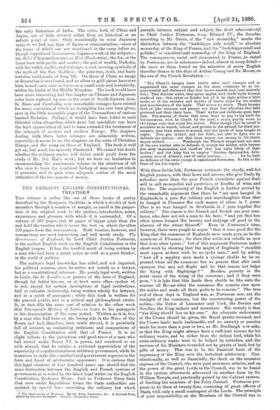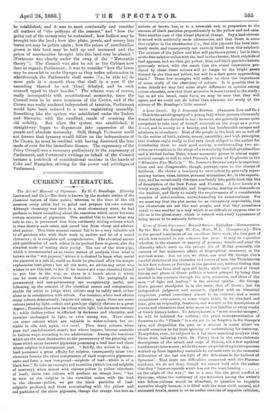THE EARLIEST ENGLISH CONSTITUTIONAL TREATISE.* Tuts volume is rather like
one of those books of poetry described by Sir Benjamin Backbite, in which a rivulet of text meanders through a meadow of margin, so small is the propor- tion of the original work to the preface, introduction, notes, excursuses, and glossary with which it is surrounded. Of a volume of 387 pages, just 48 pages of bigger print than the rest hold the treatise which forms the text on which the other 339 pages form the commentary. Both treatise, however, and commentary are most interesting, and well worth study. The Governance of England, by Lord Chief Justice Fortescue, is the earliest English work on the English Constitution in the English tongue. It has the twofold merit of being written by a man who had been a great actor, as well as a great thinker, in the world of politics.
The author's legal knowledge has aided, and not impaired, his political acumen, since he writes not merely as a lawyer, but as a constitutional reformer. His purely legal work, written in Latin, the Dc Lauditus, or praises of the laws of England, though far better known, or at least more often spoken of, is not, except for certain descriptions of legal institutions, half so valuable historically, being written wholly for lawyers, and in a spirit of panegyric ; while this book is written for the general public, and in a critical and philosophical strain. It, in fact, fills the same sort of relation to the other work that Procopius's History of Justinian bears to his panegyric or his denunciation of the same period. Written as it is, too, by a man who had been on the losing side in the Wars of the Roses, and bad, therefore, been mach abroad, it is peculiarly full of interest, as containing criticisms and comparisons of the English Constitution with that of France. It is no slight tribute to the patriotism and good•sense of a man who had served under Henry VI. in power, and wandered as an exile abroad, that he retains a profound appreciation of the superiority of constitutional over arbitrary government, while he is anxious to make the constitutional government superior to the force and fraud of aristocratic oppressors It is curious that this legal observer of four hundred years ago should find the same distinction between the English and French systems of government as is noted by the latest legal writer on the English Constitution, Professor Dicey. Just as Professor Dicey finds that even under Republican forms the State authorities are assisted by special laws overriding the ordinary law which
• The Gooernanoe of England. By Sir John Fortesene, Et. A Revised Text, edited by Charles Plummer. Oxford: Clarendon Press.
prevails between subject and subject, the droit administratif, so Chief Justice Fortescue, temp. Edward IV., the founder, according to Mr. Green, of the " new monarchy," marks the distinction between the "lordshippe only roiall," or absolute monarchy, of the King of France, and the "lordshippe roiall and politike," or constitutional monarchy, of the King of England.
The consequences, social and economical, in France, as stated by Fortescue, are in substance—indeed, almost in every detail— the same as those forced on the attention of every English traveller thence to the days of Arthur Young and Dr. Moore, on the eve of the French Revolution :—
"The Ffrencb kynges bane yerely setie such charges and so augmented the same charges as the same commons be so im- pouerysshid and distroyed that thai mows nnneth leve [can scarcely live]. Tbai drinken water, thai eyten apples, with brede right browne made of rye : thai eyten no flesshe but yf it be right seldon a little larde, or of the entrales and heydes of bestis alayn for the nobles and marcbauntes of the lande. Thai weren no wolen. Thair bansyn bath of lyke cannuas and passyn not thair kne wherfore thai bath gartered and their theis bare. Their wyfes and obilderen gone bare fote. For somme of thaim that were wont to pay to his lorde for his tenement, with he hiryth by the yere, a acute, payith nowe to the kynge ouer that acute five scutes. Wher thurgh thai be acted bi neceesite so to waccb, labour, and grubbe in the ground for thair sus- tenance, that thair nature is wasted, and the kynde of hem broght to noght. Thai gon crokyd, and ben feble, not able to fight, nor to defende the realme : nor thai bane wepen nor money to bie thaim
wepen withal' Werthnrgh the ?french kynge bath not men of his own realme able to defende it, except his nobles, wich beyren non such impositions, and therfore thai ben right likely of their bodies ;" and the king has to employ " Scottes, Spaynardes, Arro- goners, men of Almeyn, and of other nations for he hath no defence of his owne except is caste's and fortresses. So this is the frate of his Jus regale."
With these feeble folk, Fortescue contrasts the sturdy, well-fed English yeomen, with their bows and arrows, who give freely by subsidies more than the poor French contribute against their will in salt monopolies and quatrimes, or fourths of wine, and the like. The superiority of the English is further proved by the remarkable argument that there be " mo men hanged in Englande in a yere ffor robbery and manslaughter than ther be hanged in Ffrannce ffor such maner of crime in 7 yeres. Ther is no man hanged in Scotlande in 7 yere togednr ffor robbery." The reason is the French and Scotch are poor crea- tures, who dare not rob a man to his face ; " and yet thai ben often tymes hanged ffor larceny and stelynge off good in the absence off the owner thereoff." Even in Fortescue's time, however, there were people to argue " that it were good ffor the King that the commons of Englande were made pore, as be the commons of Efraunce ; for then thai wohle not rebelle as now thai done often tymes ;" but of this argument Fortescue makes short work by showing that the might of Englande " stondith most uppon archers with be no ryche men ;" and by asking " how yff a mygbty man made a rysinge shulde he be re- pressed whan all the commons ben so pouere that aftir such openyon thai mey not ffeght and be that reason not helpe the Kyng with ffeghtynge ? " Besides, poverty is the great cause of the rising of the commons ; and if they were poor, " it is lyke that this lande then shulde be like unto the reanme off Boerne when the commons ffor pouerte rose apon the nobles and made all thair godis to be commie." The true evil of those days in England was, as Fortescue saw, not the strength of the commons, but the overweening power of the nobles,—the Dukes of Lancaster and York, the Percies and Nevillea, the King-makers and nnmakers. His remedy is that "the King should live on his own." An adequate endowment of the Crown should be given, the Royal grants resumed, and the Crown lands made inalienable, and no annuity or pension made for more than a year or two, as Mr. Bradlangh now asks, so that the King might always have a sufficient income for his ordinary wants, and be richer than the richest lord, while his extra-ordinary wants were to be helped by subsidies, and the services of his Ministers rewarded not by grants of land, but by gifts of money. This was to be the financial basis of the supremacy of the King over the turbulent aristocracy. Con- stitutionally, as well as financially, the check on the excessive expense of the Council, who were paid enormous salaries, and on the power of the great Lords in the Council, was to be found in the system afterwards advocated in another form by Sir William Temple, and practically gained by the Cabinet system, of limiting the numbers of the Privy Council. Fortescue pro- poses to fix them at twenty-four, consisting of great officers of State, with only a small contingent of the Lords. The principle of joint responsibility on the Members of the Connell was to
be established, and it was to meet continually and consider all matters of "the pollycye of the reaume," and "how the going out of the money may be restrained ; how bullion may be brought into the land ; how also plate, jewels, and money late borne out may be getten again ; how the prices of merchandise grown in this land may be held up and increased and the prices of merchandise brought into this land may be abated " (Fortescue was clearly under the sway of the " Mercantile theory "). The Council was also to act as the Cabinet now does as regards Parliament; it was to consider "how the lawes mey be amendet in suche thynges as thay neden reformation in wherthrongh the Parlemente shall mowe [i.e., be able to] do more gode in a moneth than thai shall in a yere if the amending thereof be not [thus] debatyd, and be such counsell ryped to thair handes." The scheme was, of course, really incompatible with constitutional monarchy, since the Council were to be mere nominees of the Crown, and if the Crown was really rendered independent of taxation, Parliament would have been reduced to a mere registrating assembly. Something like the system was established under the Tudors and Stewarts, with the excellent result of crushing the old nobility. But when the system was established, it straightway began to degenerate into oppression of the people and absolute monarchy. Still, though Fortescue could not foresee that tyranny would follow on the independence of the Crown, he must be credited with having discerned the true mode of cure for the immediate disease. The supremacy of the Privy Council was a necessary preliminary to the supremacy of Parliament, and Fortescue's writings on behalf of the Council became a text-book of constitutional maxims in the hands of Coke and Hampden, striving for the power and privileges of Parliament.



































 Previous page
Previous page